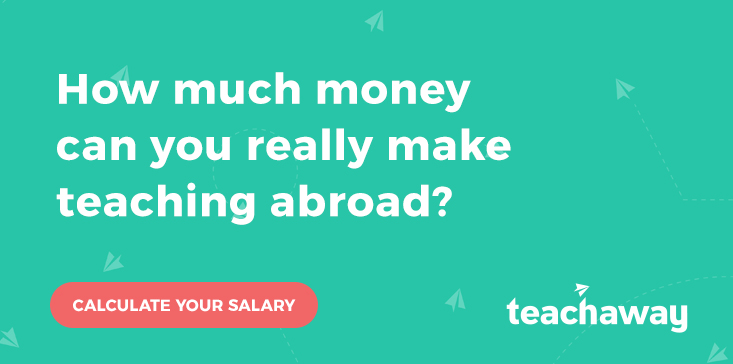South Korea is one of the best countries to teach English and save money in. This is due to the cheap cost of living, relatively high salaries and benefits offered to international teachers. Although it’s not the highest salary in the ESL teaching market, it’s one of the easiest countries to save money in due to the low setup cost, and the fact that flights, housing, healthcare and bonuses are thrown into the mix. Most teachers that journey to Korea walk away from the experience debt free and with savings.
The salary and benefits play an important role in why so many teachers flock to Korea every year. But, there are a bajillion other reasons to take the plunge: from Kimchi to KPOP, there’s no end to the amount of Korean culture becoming mainstream and curiosity about the peninsula is growing. There isn’t a foodie worth their salt that hasn’t waxed lyrical about Korea’s fermented dishes or a beauty-addict worth their lip gloss that hasn’t tried Korea’s snail-mucus skin care (way less gross than it sounds!).
Couple a growing global cultural curiosity about South Korea with the awesome salaries and potential savings on offer for ESL teachers and you’ve basically got a country that’s a magnet for teachers of all experience levels.
We’ll save the historical intrigue, next-level scenery, and sheer charm of Korean culture for another day. For now, consider this your comprehensive guide to salary and finances as an ESL teacher in South Korea.
Just tell me how much an ESL teacher makes in South Korea already
A quick google will reveal that ESL teachers in South Korea will make anywhere from $1,600 – 2,000 USD a month. Most salaries will fall in this range, but as with all things quickly googled, this information barely skims the surface of how much you will earn and save in South Korea.
The REAL average salary for English teachers in South Korea ⬇️
Average salaries vary depending on your experience, qualifications and the type of institution you’ll be teaching at. There are three main types of positions for ESL teachers in South Korea: public schools, private schools and colleges/universities. The following table gives an overview of what salary and benefits you can expect at the low, mid and high salary ranges for each of the three main categories.
| Salary and benefits for English teachers in South Korea | ||||
| Low range in USD/month | Mid range in USD/month | High range in USD/month | ||
| Public Schools
(e.g. EPIK, JLP, GEPIK) | Salary | $1,600 | $2,000 | $2,400 |
| Benefits |
|
|
| |
| Private Schools
(aka Hagwons) | Salary | $1,600 | $1,800 | $2,000 |
| Benefits |
|
|
| |
| Universities | Salary | $2,000 | $2,500 | $3,000 |
| Benefits |
|
|
| |
|
Private vs. public schools in Korea: why the difference in salary?
Private schools used to pay much higher wages for ESL teachers, but in recent years, public schools have closed the gap, adding a bunch of benefits to their contracts to make them more attractive to fluent English speaking teachers.
Generally speaking, public schools are a safer bet, teachers have less overall issues with things like end-of-year bonuses, getting deposits back and flights reimbursed. They also offer better hours and holidays.
Some private schools offer a similar standard of living, but teachers would be advised to go through a recruitment company and research a private school thoroughly before flying across the world. There’s really no need to take the risk on a school you’re not sure about when there are plenty of schools with excellent reputations recruiting ESL teachers.
Looking to maximize your saving potential? Don’t overlook teaching in rural Korea.
Many of the really rural schools don’t have enough funding (or students) to justify the expense of employing a full-time English language teacher. But they still value the experience. Smaller schools sometimes pay bigger schools to borrow their English teacher one day a week (referred to as a travel school), or to get a few hours with the fluent English speaker online.
The public school schedule isn’t high on hours (it can be anywhere from 9-22 hours a week, depending on your school). What this means is that you might get a position that ships you out to another school and gives you bonus pay for the inconvenience. Other schools will offer extra pay if you teach an hour or two online to nearby rural schools during your office hours.
None of this is set in stone, but it’s worth considering a rural area if you’re determined to save a lot of money or have student debt. Rural areas have less English teachers so you usually get all sorts of bonuses and add-ons for the inconvenience of being stretched across multiple schools.
If you’re worried about being stuck on the side of a Korean mountain, don’t be. Some rural locations have 30,000 residents! The towns are far from the remote villages you might have in mind. Public transport is second to none, and it’s worth noting that Korea is small. You’re never far from the nearest city.
What are the the initial costs of getting set up to teach in South Korea?
Korea is attractive to many graduates because it has a relatively low set-up cost.
Within a month of landing, teachers will usually have their flights reimbursed as well as a settlement bonus to help them buy a few additional things for the apartment. Most apartments come equipped with what teachers need, but the bonus can be used to splash out on new bed sheets or buy a flashy blender. Many teachers pocket this money as savings as it’s the equivalent of about $300 USD.
However, it’s important to note that you will have to shell out for flights (they will be reimbursed) and have enough money to last you the first month. Once you get through that first month you’ll get all the money back but it’s worth taking into consideration.
What’s the deal with health insurance for English teachers in South Korea?
Not only is healthcare super cheap in South Korea, but most public schools will offer a subsidized health care package. This means that if you do need to visit the hospital you won’t need to panic. Travel insurance can be pretty pricey if you’re going to live abroad for a year, so knowing that there’s healthcare lined up, means you don’t have to worry beyond getting travel insurance to cover you until the Korean health care package kicks in.
What about pensions for ESL teachers in South Korea?
Chances are that a pension isn’t high on your list of priorities right now, especially if you’re saving to pay off student debt or trying to save some money. But that doesn’t mean you should ignore this benefit when considering where to teach in South Korea. Teachers from Canada and the US can claim back whatever they’ve paid into their pension at the end of their contracts.
Side gigs to boost your English teaching salary in Korea
Can I make extra money by private tutoring on the side in South Korea?
The easy answer is yes! South Korea is a highly competitive place for students and some parents will stop at nothing to get their students the best education possible. English is one of three core subjects in schools (excellent grades in Korean, math and English are required to get into any good university), so this means there are plenty of parents willing to hire foreign teachers as private tutors.
The better answer is no! Although ESL teachers can pick up extra money by privately tutoring local students, this cash-in-hand process is actually in violation of visa stipulations. If you’re already under contract at a school, it’s a good idea to stick to the contract you’ve signed. The bonuses, paid flights and health insurance will far outweigh the benefits of risking it all for a sneaky extra $100 bucks a week through private tutoring.
Instead, why not try:
Teaching at a South Korean summer camp
What many teachers don’t realize about teaching in South Korea is that once you’re there you may find other opportunities to supplement your income. When considering these opportunities make sure they come through official channels, as you don’t want to violate your visa.
For example, programs like EPIK (one of the best teach abroad programs out there) and JLP will often pull from the pool of teachers already in the country to staff their English summer camps. These camps also attract some temporary contract teachers, but are largely staffed by people who work full time in one of Korea’s public schools.
Read this: Everything you need to know about applying (and getting hired) for the EPIK program
Hagwons will also run their own summer camps, but it may already be considered part of your initial contract. With public schools, anything outside of your main school hours (offered by the school board rather than your school) will be considered additional and will come with travel expenses and the equivalent of about $500 USD for a week of camp teaching. This can be a nice bonus at the end of term if you can get it. It’s also a nice way to meet other teachers and new students.
How much can I save teaching English in South Korea?
There’s no hard-and-fast number for this because everyone is different. Some teachers will spend lavishly on cosmetics and travel while others will operate on a tight budget. Teachers can easily save the equivalent of $10,000 USD while traveling and singing the nights away in Korea’s crazy Karaoke booths. Careful spenders can pocket as much as $17,000 USD. And the stingiest souls will save even more.
You can enjoy an amazing lifestyle on very little in South Korea, but if you’re interested in saving or paying off a loan, you might want to make a budget and stick to it. It can be tempting to spend multiple weekends perusing the shopping districts of Seoul or jetting off to nearby Japan. But if you’ve got big plans for your salary, you should be a little careful. There are lots of inexpensive things to do.
Most teachers manage to save or pay off a decent chunk of money while still enjoying all that being in Korea has to offer. If you’re interested in saving a LOT (and who isn’t), try to take most of your excursions in-country: hike the endless Korean mountains and eat mostly Korean food. The only things that are really expensive in Korea are imported goods. If you can get down with the bibimbap – you’ll be all set to make bank.
How much is it actually possible to save per month teaching in South Korea?
A lot of teachers manage to put aside between $700 – 1,000 USD per month. There are teachers that save a lot more and teachers that save considerably less, but teachers can live comfortably and still manage to save that much.
Average cost of living in South Korea (based on Seoul – the most expensive city)
Alright, so we could go blue in the face explaining how cheap Korea is. Rather than that, we’ll just give you a quick glimpse at some of the prices you can expect to find. This is the cost of living in South Korea at its most expensive (and some areas are considerably cheaper – hello rural towns!)
| Utilities | Average cost in USD |
| Basic (electricity, heating, air con, water, garbage) | $160 |
| Cell phone |
|
| Food & Drink | |
| McDonald’s meal | $5 |
| Meal in a Korean restaurant (inexpensive) | $6-7 |
| Meal in a Korean restaurant (mid-range) | $10-15 |
| Cappuccino (regular) | $4 |
Okay, so how easy is it to get a job teaching English in South Korea?
Qualifying for teaching jobs in South Korea isn’t difficult. All you really need is a TEFL certificate and a bachelor’s degree. It’s possible to shop around for private positions or part-time gigs that won’t need both qualifications, but generally, most teachers will have these minimum requirements.
Read this:Teaching English in Korea: What are the requirements?
Korea rewards both experience and qualifications. The more teaching you do and the more qualifications you have, the more you’ll get paid. Some of the highest wages go to teachers that have built rewarding careers in Korea. Which makes Korea attractive to ESL teachers looking to build careers.
Ready to make bank teaching in Korea?
Great! If you’re interested in working as an ESL teacher in South Korea, then your best bet is to apply to teach at a public school through EPIK. If you’re not sure what you want and would like to see a range of opportunities, then take a look at the teaching jobs in South Korea on Teach Away and get your application in, stat!
Fighting!
(Koreans say something that sounds an awful lot like fighting (huwaiting!) when they cheer each other on… if you blurt out ‘fighting’ with a big grin, they will assume that’s what you mean!)




